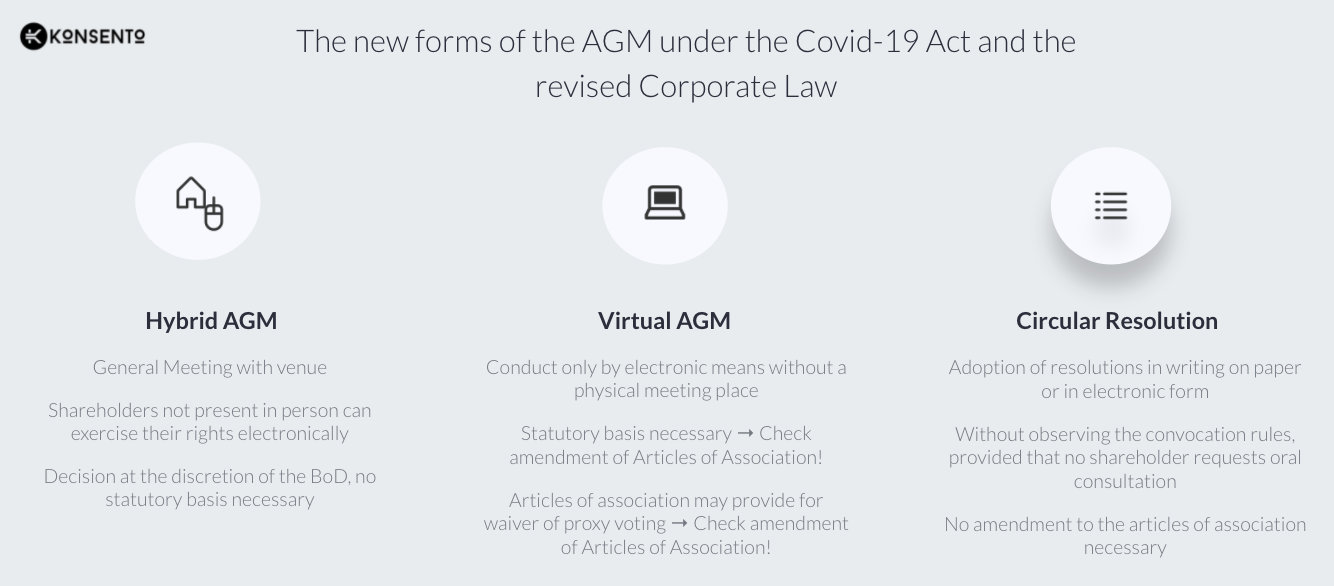Revision of company law: The new forms of the general meeting of shareholders
The Corona pandemic and the lockdown of spring 2020 helped Swiss stock corporations to modernise the Stock Corporation Act at an early stage: by means of the Covid Ordinance, the Federal Council enabled shareholders to exercise their rights in electronic form. In doing so, they introduced an instrument at an early stage that was to be introduced with the reform of the Stock Corporation Act that had already been negotiated in parliament for several years and finally passed in June 2020: the online general meeting. In the following sections, we will highlight the main features of the new forms of participation in general meetings and explain what influence the Covid measures will play until the new Stock Corporation Act comes into force.
Stock Corporation Act goes digital
Before the introduction of the Covid measures - which are of limited duration - the holding of online general meetings (AGMs) was fraught with considerable legal uncertainties. The revision of the Stock Corporation Act passed by parliament will now put an end to this ambiguity. Its purpose is to improve corporate governance even in unlisted companies and to modernise the AGM by allowing electronic means.
In addition to the traditional AGM with physical attendance, the revised Stock Corporation Act now provides for the following three variants of the AGM:
- virtual AGM without a meeting place,
- hybride GV (GV mit physischem Versammlungsort und der Möglichkeit einer virtuellen Teilnahme)
- Resolutions by circular letter (in writing or electronically)
The new forms of general meetings
Virtual general meetings without a physical venue
From now on, the general meeting can be held exclusively by electronic means and without a meeting place. However, this requires that the articles of association explicitly provide for the possibility of virtual general meetings. Furthermore, the articles of association of unlisted companies may waive the appointment of an independent proxy. Both require a corresponding resolution of the AGM and an amendment of the articles of association for most public limited companies.
At the virtual AGM, the correct exercise of shareholders' rights and, in particular, the possibility of casting votes or changing them during the AGM as well as undistorted voting results must be ensured. This requires, among other things, that the identity of the participants is known.
Hybrid General Meeting
Shareholders who are not present at the General Meeting may exercise their rights electronically. In this case, the board of directors must regulate the use of electronic means and ensure that the identity of the participants is known, the votes at the general meeting are transmitted directly, each participant can make motions and take part in the discussion. In particular, it should be possible for the shareholder to make his decision during the AGM as a result of the discussion and to cast his vote during - and not only before - the AGM, regardless of whether he or she participates physically or electronically. Finally, the result of the vote must not be distorted.
AGM resolutions by circular means
The new Stock Corporation Act then provides for a new form of universal general meeting. In the case of a universal meeting, a general meeting is held without complying with the regulations applicable to the convening of a meeting (e.g. notice period), provided that none of the shareholders objects. Until now, however, universal meetings had to be held physically or by mandating and instructing a proxy. Now, resolutions may be passed in writing or in electronic form, unless a shareholder or his representative requests oral deliberation.

Entry into force
The revised Stock Corporation Act is not expected to enter into force until 2023. However, as mentioned at the beginning, the special measures to combat Covid-19 have already allowed the above-described forms of participation and decision-making at AGMs since spring 2020. Parliament has now enshrined in the Covid-19 Act their extension until the entry into force of the revised Companies Act, but at the latest until 31 December 2023. This provision is not affected by the referendum against the Covid-19 Act, which should pave the way for the continuation of virtual, hybrid and circular AGMs.
And why Konsento?
We at Konsento have set out to offer you a platform to conduct general meetings electronically and online in compliance with the law. You can also manage and organise your shares, investments and communication digitally.
The points mentioned in this blog post are only a very brief excerpt from the changes in the Code of Obligations that will come into force with the revised Stock Corporation Act. However, users of the Konsento platform enjoy the comfort of not having to deal with the legal details. Our platform is designed to take into account key requirements of the Stock Corporation Act - especially when it comes to holding your virtual, hybrid or circular general meeting. Our legal and financial experts build know-how into the platform to save you time and expensive advisory fees. You can also save time by using our platform to record details of shares, resolutions, election results, etc.
Would you like to learn more about the topic without obligation or have we made you curious about what else our platform has to offer? Then write to us either via our contact form or via hello@konsento.ch - we look forward to hearing from you!


